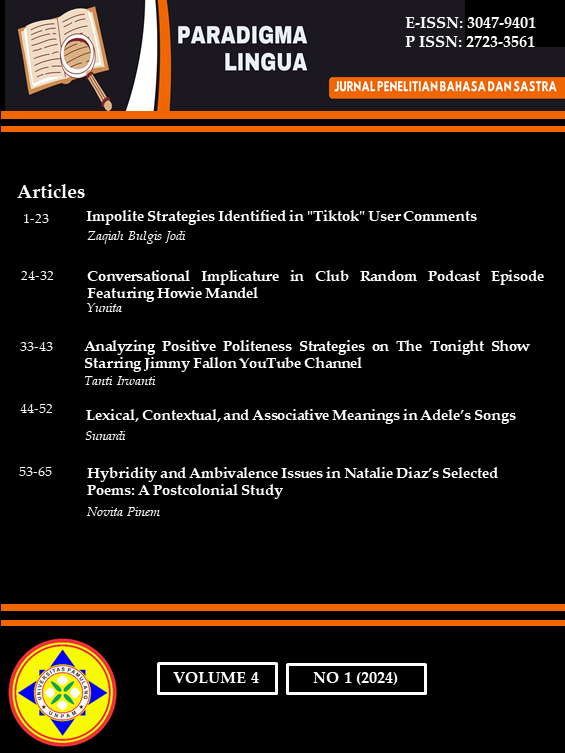Analyzing Positive Politeness Strategies on The Tonight Show Starring Jimmy Fallon YouTube Channel
Keywords:
Brown and Levinson theory, factors, positive politeness strategiesAbstract
The study is used to analyze the positive politeness strategy in the talk show entitled “The Tonight Show Starring Jimmy Fallon.” The aims of the study are to find out the types of positive politeness strategies and the factors influencing the use of positive politeness strategies in relation to Brown and Levinson politeness strategies. It is a descriptive qualitative study. The data of the study were the utterances of the host in the talk show. Here, only the types of positive politeness strategies and factors of influencing the use of positive politeness strategies were analyzed. The writer uses Brown and Levinson’s theory to analyze the data. Based on data analysis, it was found that there were 36 data which content of positive politeness strategies. The type of politeness strategies that are often used by the host are strategy 1 notice attending to the hearer (wants, interest, needs and goods) and strategy 2 exaggerate (interest, approval, sympathy). Then the writer also finds payoff and circumstances as some factors which influencing positive politeness strategies
References
Archia, J. J. (2014). A Pragmatic Analysis of Positive Politeness Strategies as Reflected by The Characters in Carnage Movie. Thesis: English Language and Literature Study Program Faculty of Languages and Arts, Universitas Negeri Yogyakarta
Brown, P & Levinson, S. (1987). Politeness Some Universals In Language Usage. Cambridge. University Press
Culpeper, j. (2009). Impoliteness: Using and Understanding the Language of Offence. ECSR project website: http://www.lancs.ac.uk/fass/projects/impoliteness/
Denzin, N.K & Licoln, Y.S. (2000). The Discipline and Practice of Qualitative Research. 1–44.
Griffith, P. (2006). An Introduction to English Semantics and Pragmatics. Edinburgh: University Press.
Hsieh, H. F., & Shannon, S.E (2005) Three Approaches to Qualitative Content Analysis. Qualitative health research, 1277-1288. doi: 10.1177/1049732305276687
Indrani, E. (2014). Positive Politeness Strategies Used by Grace and Meg. Thesis: Program Studi Sastra Inggris Fakultas Ilmu Budaya, Universitas Dian Nuswantoro Semarang
Krippendorrf, K. (2004). Content Analysis An Introduction to Its Methodology. USA: Sage Publication
Majeed, I.R.F.K.A (2009). The Realization of Positive Politeness Strategies in Language: The Politeness Theory of Brown and Levinson. Journal of College of Education For Women, 20(1) 512
Marpudianto, K. (2020). Positive Politeness Strategies Used by David Muir and Donald Trump on “Abc News” and in “Charlie Rose Show”. Etnolingual, 4(1) 11.
Mills, S. 2003. Gender and Politeness. Cambridge: Cambridge University Press
Muftiarizqi,Z. (2015). Politeness Strategies in The Bel Ami Movie. Lexicon, 4(1) 114-122
Nastha. H. M. (2019). Politeness Strategy Used in Jimmy Kimmel Live Show. Thesis: Faculty of Teacher Training and Education, Universitas Muhammadiyah Sumatera Utara
Prandyani. Budiarsa, & Sudana (2017). Positive Politeness Strategies in Animation Movie ‘’Home’’ Directed by Tim Johnson. Jurnal Humanis,Fakultas Ilmu Budaya Unud, 19(1), 198.
Pangestuti, W. (2015). Politeness Strategies Used by Deddy Corbuzier In Interviewing Entertainer and Non- Entertainer in Hitam Putih Talk Show. Thesis: Faculty of Humanities, Diponegoro University Semarang
Pramiardhani, A.S (2010). An Analysis of Positive Politeness Strategy Employed by the Characters in the Movie Entitled “Big Fish”. Thesis: English Department Faculty Letters and Fine Arts, Sebelas Maret University Surakarta
Sapparudin. (2022, Juni 18). Netizen Indonesia Dinilai Kurang Sopan di Media Sosial. https://m.rri.co.id/samarinda/800-gaya-hidup/1498910/netizen-indonesia-dinilai-kurang-sopan-di-media-sosial
Sari, D. N. (2018). Donald Trump’s Politeness Strategies in Interview with News Anchor of Abc News. Thesis: English and Literature Department Adab and Humanities Faculty, Universitas Islam Negeri Alauddin Makassar
Tantri, M. (2020). An Analysis of Positive Politeness Strategies in the Ellen Show: Pragmatics Approach. Thesis: Department of English Literature Faculty of Social Sciences and Humanities, Putera Batam University
Wang, Y. (2010). “Analyzing Hedges in Verbal Communication: An Adaptation-Based Approach”. Henan: Henan University of Technology
Wardhaugh, R & Fuller M J. (2014). An Introduction to Sociolinguistics (7thEdition). Oxford/UK: Wiley Blackwell Publisher.
Watts, R. (2003). Politeness. New York: Cambridge University Press
Weiten, W. (2007). Psychology: Themes and Variations. Belmont: Wadsworth
Yule, G. 2010. Pragmatics. New York. Oxford: University Press.
Yule, G. 1998. Pragmatics (Revised Ed.). Oxford: Oxford University Press.
Yuniarti. Natsir, & Setyowati (2020). Positive Politeness Strategies on Catwoman Movie. Jurnal Bahasa,Sastra,Seni, Dan Budaya,4(2), 264.
Downloads
Published
How to Cite
Issue
Section
License
Authors who publish with this journal agree to the following terms:
- Authors retain copyright and grant the journal right of first publication with the work simultaneously licensed under a Creative Commons Attribution License that allows others to share the work with an acknowledgement of the work's authorship and initial publication in this journal.
- Authors are able to enter into separate, additional contractual arrangements for the non-exclusive distribution of the journal's published version of the work (e.g., post it to an institutional repository or publish it in a book), with an acknowledgement of its initial publication in this journal.
- Authors are permitted and encouraged to post their work online (e.g., in institutional repositories or on their website) prior to and during the submission process, as it can lead to productive exchanges, as well as earlier and greater citation of published work (See The Effect of Open Access).
Paradigma Lingua have CC-BY-SA or an equivalent license as the optimal license for the publication, distribution, use, and reuse of scholarly work.
In developing strategy and setting priorities, Paradigma Lingua recognize that free access is better than priced access, libre access is better than free access, and libre under CC-BY-SA or the equivalent is better than libre under more restrictive open licenses. We should achieve what we can when we can. We should not delay achieving free in order to achieve libre, and we should not stop with free when we can achieve libre.


